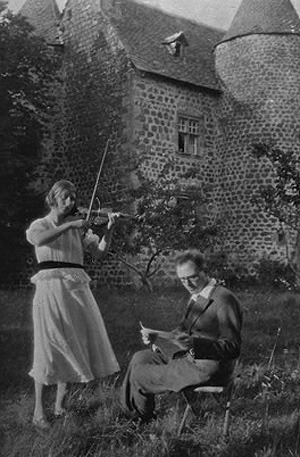Claire Delbos facts for kids

Claire Delbos (born Louise-Justine Delbos, November 2, 1906 – April 22, 1959) was a French violin player and composer. She was also the first wife of the famous composer Olivier Messiaen. She was often known by her stage name, Claire Delbos.
Contents
Her Life
Claire Delbos was born in Paris, France. Her father, Victor Delbos, was a professor at the Sorbonne. Even though she was baptized Louise Justine, she was usually called Claire or Claire-Louise after she got married.
She first studied music at a private school in Paris called the Schola Cantorum. Later, she went to the Paris Conservatoire to study violin and how to compose music.
Claire's amazing violin skills caught the attention of a young composer named Olivier Messiaen. They started performing concerts together in Paris in the early 1930s. They got married on June 22, 1932. Another composer, Claude Arrieu, was Claire's bridesmaid.
As a wedding gift, Messiaen wrote a piece for violin and piano called Thème et variations for Claire. They performed it together on November 22, 1932.
That summer, the Messiaens moved into an apartment in Paris. This was their home for six years. They sometimes had small musical gatherings there with friends, and that's where they met the Jolivets. Messiaen wrote some of his music to celebrate their happy marriage. For example, his song cycle Poèmes pour Mi (1936) was based on his own poems about the joy of being married. "Mi" was Messiaen's loving nickname for Claire. Claire also wrote several pieces for the organ, including Paraphrase sur le jugement dernier and L'offrande à Marie, which she wrote for Messiaen.
In the first few years of their marriage, the Messiaens often spent holidays at a family castle called Château St Benoît. This castle, owned by Claire's family, was a great place for Messiaen to compose. He wrote a lot of his piece L'Ascension there. After the successful Thème et variations, Messiaen wrote another violin piece for Claire called Fantaisie. This piece wasn't published until much later, around 2007 or 2008.
Claire had some health challenges early in her marriage. In 1937, their son Pascal was born. Messiaen then wrote another song cycle, Chants de terre et de ciel (1938), which was about all three members of their family. The Messiaens then moved to a different apartment in Paris.
Towards the end of World War II, Claire had an operation. After this, she started to lose her memory. She went into a special care facility and stayed there for the rest of her life, as her health slowly got worse. She passed away in 1959.
Her Music (Compositions)
Claire Delbos wrote many pieces of music. Here are some of them:
Songs (for voice and piano)
- Primevère (1935) (five songs based on poems by Cécile Sauvage, who was Messiaen's mother):
- Le long de mes genoux
- J'ai peur d'être laide
- Mais je suis belle d'être aimée
- Je suis née à l'amour
- Dans ma robe à bouquets bleus
- L'âme en bourgeon (1937) (eight songs based on poems Cécile Sauvage wrote about her son Olivier's birth):
- Dors
- Mon coeur revient à son printemps
- Je suis là
- Te voilà hors de l'alvéole
- Je savais que ce serait toi
- Maintenant il est né
- Te voilà mon petit amant
- Ai-je pu t'appeler de l'ombre
- Trois aspects de la mort (first performed in 1947):
- Sans espérance (poem by Cécile Sauvage)
- Lamentation et terreur (from the Book of Job)
- Vers elle, avec confiance (poem by R. de Obaldia)
Other Vocal Music
- Psalm 141, for a soprano singer, a women's choir, four ondes Martenots (an electronic instrument), and piano. This piece was never published.
Organ Music
- Deux pièces (1935)
- L'homme né de la femme vit peu de jours
- La Vierge berce l'enfant
- Paraphrase sur le jugement dernier (1939)
- L'offrande à Marie (1943)
- Voici la servante du Seigneur
- Vierge digne de louanges
- Mère des pauvres
- Mère toute-joyeuse
- Debout, la Mère des douleurs
- Secours des Chrétiens, reine de la paix
- Parce, Domine 'Pardonnez, Seigneur, à votre peuple', pour le temps de Carême (1952)
See also
 In Spanish: Claire Delbos para niños
In Spanish: Claire Delbos para niños
 | Delilah Pierce |
 | Gordon Parks |
 | Augusta Savage |
 | Charles Ethan Porter |

